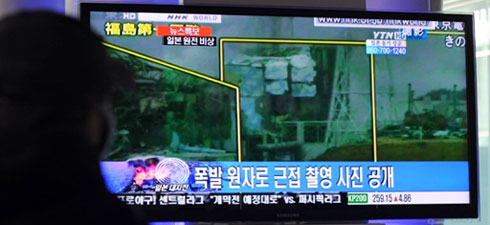A deeply religious person who lived in my hometown liked to say that during the Chernobyl disaster in 1986 she had a very specific vision. One day like any other, while most people across the Soviet landmass were, as usual, lined up outside the shops, leading their unhurried lives, and the news channels were broadcasting nothing about the events in the Ukrainian Soviet Socialist Republic, the hand of God pointed across the sky to the south, by lining up the clouds.
Today, we perceive the natural catastrophes in Japan and their consequences in a totally different environment, because we all live in the same global media landscape. We ourselves help to fuel that space while greedily consuming all the information that floods across it. But are we really so much better informed about reality than in the Soviet era, when we lived in “blissful” ignorance?
Instead of too little information, we suffer a thorough glut of it. Tens of thousands of opinion makers, experts and talking heads clog our screens via the Internet. Who to believe, who to cock an ear to? Certainly, in the era gone by, a single political party thought things had to be kept hush-hush. In today’s raucous information jungle, though, there are many other interests being trumpeted.
After Chernobyl, the hand of God is still there
Despite the offers of help to Japan coming in from many countries, the world of global competition remains incredibly cynical. Even while Japan is tallying up staggering costs and will have to pump in significant funds to keep its economy breathing, “nervous markets” and cold-blooded speculators are punching the numbers on how many millions have topped up their portfolios. What’s more, the attention of the public has been diverted away from Libya, where one has stopped counting whether the numbers of those killed by the dictator Gaddafi anxious to keep a grip on power are in the hundreds or thousands.
In this situation the media should be a refuge.Instead, they have let themselves be borne away on the mainstream. Rather than offering quality, they fall back on quantity, easily exploited by all and sundry to pursue private interests. At a time when the European Union with its open society and powerful public relations is announcing its intentions to test its nuclear plants and the Greens are demonstrating in Helsinki, nobody is paying any particular attention to nuclear power plants in Russia, the nearest of which, Sosnovy Bor [between St. Petersburg and the Estonian-Russian border], is chugging away right next to us.
One could say that 25 years after Chernobyl, the hand of God is still there. The difference is that today we trace such events not in the clear blue sky but on our flat screens. The increase in the web of news coverage has also cast a wide and darkening web of fear and panic. In Finland, it appears, iodine tablets have already been stockpiled in huge quantities.
Lithuania-Belarus
A fear-inspiring power project
“Vilnius is the most dangerous capital city on the planet”, writes an alarmed Lietuvos rytas. The Lithuanian daily is worried about the shroud of silence surrounding a Belarusian government plan to build a nuclear power plant 50 kilometres from the Lithuanian capital. “Vilnius is accusing Minsk of failing to respond to all its concerns over the environment,” writes the daily. The environmental impact studies are not yet in and Vilnius has not been consulted. The safety of its 600,000 inhabitants is a sensitive point, since it would be part of the zone to be evacuated in case of accident. “We need to know before building where the population will have to take refuge in the event of radiation,” writes Lietuvos rytas, which notes that on March 15 Russian Prime Minister Vladimir Putin flew to Minsk for talks with local authorities on the building of the new plant.
Do you like our work?
Help multilingual European journalism to thrive, without ads or paywalls. Your one-off or regular support will keep our newsroom independent. Thank you!
















